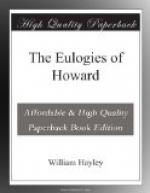“That capricious and detestable spirit of Detraction, which on Earth never fails to persecute superior Virtue, has not scrupled to assert that the affliction, to which I allude, was the mere consequence of paternal austerity. The Earth itself, though frequently accused of being eager to receive ideas that may abase the eminent, could hardly admit a calumny so groundless and irrational. In this purer spot it is utterly needless to prove the innocence of an exalted being, to whom we are only solicitous to pay that sincere tribute of praise and veneration which we are conscious he deserves. In truth, this admirable Character seemed to illustrate the philosophical maxim, that mildness is the proper companion of true magnanimity. He had a gentleness of manners, that was peculiar to himself; and, instead of possessing such imperious severity of spirit as might produce the calamity I allude to, he was really endued with such native tenderness of heart as must have sunk under it, had he not found in the unexampled services that he rendered to the world, an antidote to the poison of domestic infelicity. It is among the most gracious ordinances of Providence, that man is sure to find the most powerful relief for his own particular afflictions, in his endeavours to alleviate the sufferings of others. And permit me to add, it is this beneficent law of our nature, that gives a peculiar charm and dignity to the Medical Profession; a profession singularly endeared to the affectionate Howard! not only as its compassionate and active spirit was the guide of his pursuits, but as one of its prime ornaments was his favourite associate and his bosom-friend. If different classes of men are to vie with each other, as it may certainly become them to do, in rendering various honours to this their matchless Benefactor; I hope we shall display, with the most affectionate spirit, the deep interest that we ought to take in his glory. I think it very desirable that every Physician should possess a Medal of Howard, not only to shew his veneration for the great Philanthropist, but to derive personal advantage from such a mental Amulet, if I may hazard the expression. Most of us, in the exercise of Medicine, feel at particular moments that our spirits are too sensibly affected by the objects we survey; that scenes of misery and infection depress and alarm: at such a time how might it rekindle the energy of our minds to contemplate a little effigy of Howard! to recollect, that all the trouble and danger that we encounter, in the practice of a lucrative profession, are trifling in the extreme, when compared to the labour and the peril, which this wonderful man most willingly took upon himself, without looking forward to any reward but the approbation of Heaven!
“I mention not a Medal as a new idea—it has been already in contemplation; and a motto for it suggested, which applies with such singular force and propriety to the person whom it is designed to commemorate, that perhaps the wide range of classical literature could not afford another passage so strikingly apposite to a character so extraordinary—




